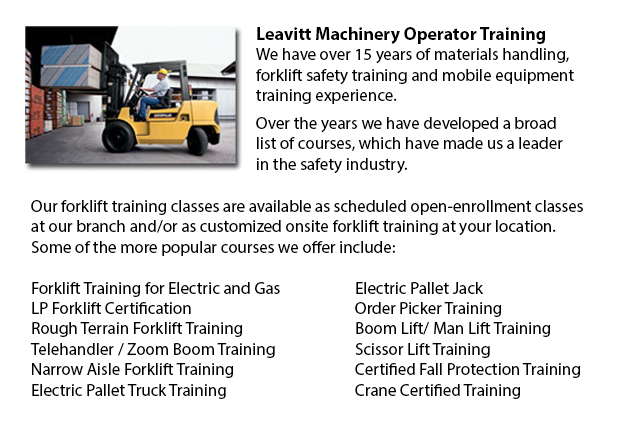
Saskatchewan Forklift Certification Schools - Forklift Certification is mandatory within North America. Therefore, forklift training programs are necessary both for companies and for individuals seeking work in industries as forklift operators. Forklift training focuses on safety and health concerns involved in utilizing forklifts. Safety concerns affect both the forklift driver and employees and other individuals who are in the vicinity of the forklift. Businesses might be subject to penalties if they are caught with drivers who are un-certified during an inspection. There are several compelling reasons why businesses should follow forklift standards.
Most state, provincial and federal regulations require a worker evaluation of the skills required for forklift safety before the employer signs off that the worker is certified. There are several ways to obtain forklift training for workers, such as on-line forklift training. Then again, employers should be aware that forklift certification training is not "just a test". Proper forklift training should include some areas of study, like theory and hands-on practice. Regulations do not require employers to have an outside organization to certify forklift operators.
The suggested program for a quality forklift certification service includes both an onsite component and classroom training. Classroom training usually features informative sessions with power point presentations, videos, models and discussions. Students usually are required to write a test to check for comprehension of subject matter. Certificates of completion are issued upon successful completion of the class.
The use of the equipment evaluation requires the trainee to know the job site dangers, pre-operational machine inspection, operational instruction and a pass/fail operational test.
Training normally comprises the following subject areas: Controls & Instrumentations; Understanding legislations and regulations; Engine Operation and Maintenance; maneuvering and Steering; Visibility, Fork & Attachment Limitations; Rated Capacities, Stability, Inspection & Maintenance; Load Manipulation; Refueling; Pedestrians, and Dangerous Locations & Rough Terrain Operation. Moreover, there are training courses available for employees who are transitioning to new job positions.
-
Saskatchewan Forklift Training School
Saskatchewan Forklift Training School - Forklift Training School - Federal and industry regulators have established the criteria for forklift safety training according to their current standards and regulations. Those wishing to operate a forklift sh... More -
Saskatchewan Scissor Lift Ticket
Saskatchewan Scissor Lift Ticket - The scissor lift truck has been a great benefit to many businesses since the effort and manpower to run one of these machines is very minimal. Furthermore, numerous workplace injuries have been avoided by having one... More -
Saskatchewan Crane Operator Classes
Saskatchewan Crane Operator Classes - For the supervisors and the operators, new and current, the crane operator training course is suitable for all. Course content addresses relevant provincial, state and federal safety regulations. The first part o... More -
Saskatchewan Manlift Training
Saskatchewan Manlift Training - There are many manlift training courses that offer a review of the manlift equipment. The practicum part of the training is another important portion of the program. In this section the trainee has chance to demonstrat... More -
Narrow Aisle Forklift / Order Picker Training / Electric Pallet Jack / Electric Pallet Truck Training in Saskatchewan
A pallet lift is a device built principally for moving pallets of irregular weights and sizes. They can be used in conjunction with cranes, platform lifts and other heavy duty machines as an appendage piece or to be used on their own. Pallet hoists a... More -
Saskatchewan Telehandler Training Courses
Saskatchewan Telehandler Training Courses - The employer has the responsibility to make certain that their employees are trained to work proficiently using telehandler machinery. The personnel should be assessed for their ability to utilize the equip... More -
Saskatchewan Heavy Equipment Training Schools
Saskatchewan Heavy Equipment Training Schools - There are many heavy equipment training schools to pick from. If you want to get to the best, it is important to check several factors of the school to be able to ascertain the level of education you wi... More -
Saskatchewan Crane Training Schools
Saskatchewan Crane Training Schools - We have designed numerous Mobile Crane Operation programs at our Crane Training Schools. These programs are recommended for the skilled operator who needs re-certification or certification, and for inexperienced... More

Forklift Certification Saskatchewan
TOLL FREE: 1-888-254-6157
Regina, Saskatchewan
forkliftcertificationsaskatchewan.com
Email Us
About Us


